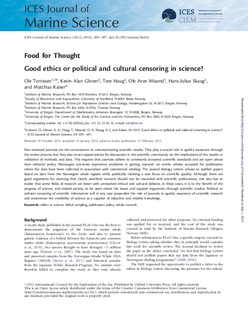Good ethics or political and cultural censoring in science?
Journal article, Peer reviewed
Permanent lenke
http://hdl.handle.net/11250/293624Utgivelsesdato
2012-02-13Metadata
Vis full innførselSamlinger
- Articles [3012]
- Publikasjoner fra CRIStin [3070]
Sammendrag
Peer-reviewed journals are the cornerstones to communicating scientific results. They play a crucial role in quality assurance through the review process, but they also create opportunities for discussions in the scientific community on the implications of the results or validation of methods and data. This requires that journals adhere to commonly accepted scientific standards and are open about their editorial policy. Norwegian scientists experience problems in getting research on minke whales accepted for publication where the data have been collected in association with commercial whaling. The journal Biology Letters refuses to publish papers based on data from the Norwegian whale register while publically claiming a sole focus on scientific quality. Although there are good arguments for claiming that clearly unethical research should not be rewarded with scientific publications, one also has to realize that some fields of research are beset with unresolved ethical and cultural debates. In these cases, it is to the benefit of the progress of science, and indeed society, to be open about the issues and support arguments through scientific studies. Political or cultural censoring of scientific information will in any case jeopardize the role of journals in quality assurance of scientific research and undermine the credibility of science as a supplier of objective and reliable knowledge.
Beskrivelse
-

